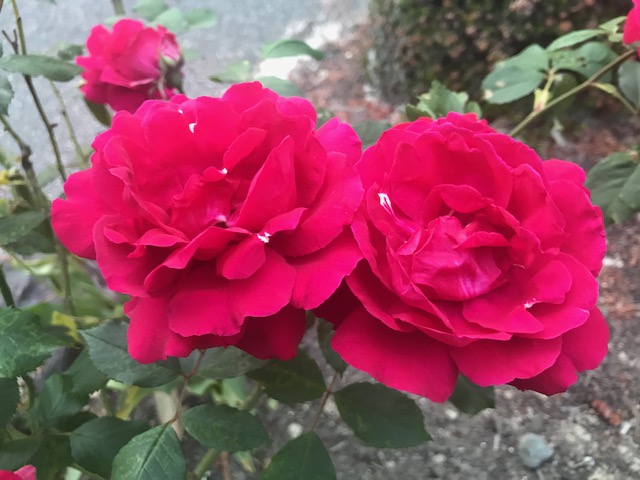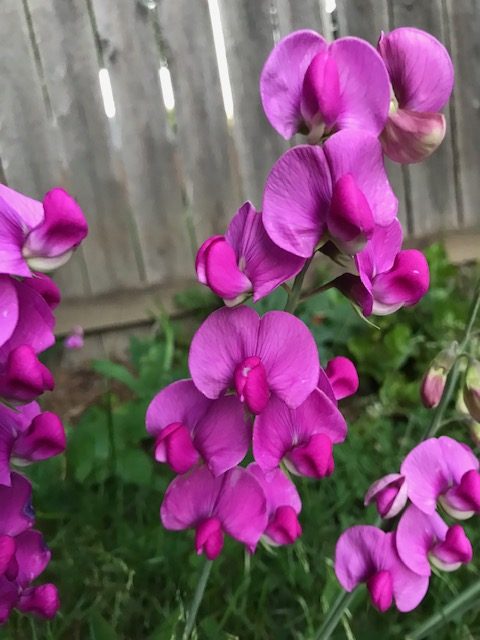

(28) And about clothing, why are y’all worried? Learn thoroughly from the wildflowers of the field, how they grow; they do not labor nor spin. (29) But I say to y’all that not even Solomon in all his glory was clothed like one of these ones. (30) And if God so enrobes the grass of the field, which is today, and tomorrow is thrown into a furnace, (will he) not much more y’all, y’all of little faith? -Jesus (Matthew 6:28-30, my translation)
I didn’t realize, until I translated this passage, that the verb in v. 30—translated above as enrobes—is different from the verb in v. 29, translated as clothed. I thought Solomon in his glory was clothed, and so the wildflowers, too, were clothed. But even more gloriously.
This was a reasonable thing to think, given that the NRSV translates both verbs as clothed, and the NIV goes for dressed when it comes to Solomon and clothed when referring to the grass.
I kind of like the translation enrobes for the grass, though. I feel like it adds another dimension, another flavor. It isn’t just that the wildflowers are clothed even more beautifully than Solomon. They aren’t just clothed, like he is. They’re enrobed.
This word that I’m translating as enrobed is ἀμφιέννυμι. And to be clear, ἀμφιέννυμι could also be translated as clothed. But it would be a little odd for Jesus/Matthew to use two different verbs in adjacent sentences to mean the same thing. We might do this in English for style points, but people didn’t really do this in Koine Greek.
I also think it’s interesting that this word, ἀμφιέννυμι, comes from a root that means “to invest.” I like the possible implication: that God enrobes the wildflowers in a way that evokes the concept of investment. God invests, or God is invested, in the wildflowers—even if by typical capitalist standards it may be an unwise investment; after all, the wildflowers pop up among the grass of the field, and the whole lot of it is here today but burned up in the furnace tomorrow.
I also find it interesting that ἀμφιέννυμι is used only four times in the whole New Testament. It isn’t one of the usual words for clothing. (In comparison, the word that describes Solomon being clothed in v. 29 is used 24 times in the New Testament.)
And it’s really just used in two different stories.
There are Jesus’ words about the wildflowers here, and his very similar words in Luke 12:28.
And then there are Jesus’ words about John the Baptist in Matthew 11:8 (and his very similar words in Luke 7:25): As John’s disciples were leaving, Jesus began to speak to the crowd about John: “What did you go out into the wilderness to see? A reed swayed by the wind? 8 If not, what did you go out to see? A man dressed in fine clothes? No, those who wear fine clothes are in kings’ palaces” (Matt 11:7-8, NIV).
“A man dressed in fine clothes”—or, more literally, “a person enrobed in soft clothing.” Or something like that. Rich folks who hang out in kings’ palaces are enrobed in the same way the grasses of the field are enrobed. (Side note: check out this post for more thoughts on Matthew 11:7-8 and the surrounding verses if you’re interested.)
Or, to look at it another way, God’s plant creations, like wildflowers, are enrobed in beauty—while God’s prophets hang out far from kings’ palaces. An interesting contrast.
Anyhow, I like the idea of short-lived and fragile wildflowers being enrobed with the kind of beauty even the richest humans only dream of. That’s cool.
And I like that we’re talking about wildflowers, here—the kind of plants not intentionally cultivated by humans. The kind we easily overlook. The kind we don’t even try to save from the furnace as they get thrown in to be burned up alongside the grass.
I think of the landscaping we inherited when we moved into our home. We have several rose plants, and they’re very pretty—but also (in some cases, anyway) very high maintenance. They want to be deadheaded constantly, fertilized every few weeks, watered on hot days (but not during the heat of the day), cleared of blackspot-infected fallen leaves, pruned yearly.
The rose plants are so needy. In contrast, there’s a sweet pea plant that seems to just magically grow back year after year. It’s more like a weed, really—and a tenacious one. It takes over an impressively large space if I don’t cut it back. And it’s also really beautiful.
I wonder if this is the sort of thing Jesus is thinking of when he talks about God enrobing the lilies—not the plants we intentionally cultivate for their beauty, but the ones that just grow on their own. Is a rose more beautiful than a sweet pea? I’m not sure. I feel like they’re both gorgeous in their own ways. God enrobes them both.
Maybe the rich kingliness of the word enrobe can help us see wildflowers—and the natural world in general—closer to the way God does.
Solomon was just clothed. But the wildflowers are enrobed. God treasures them, holds them, doesn’t just take care of their needs but makes them glorious. And this is God’s heart toward us as well.
Have a favorite wildflower? Thoughts or feelings about roses or sweet peas or Solomon or clothing and robes? As always, feel free to holler in the comments or via email!